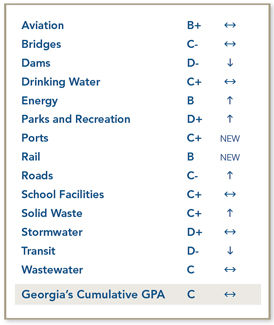Georgia's C Infrastructure
January 13th, 2014 | By: Infrastructure Report Card
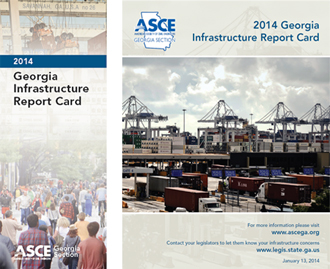 Georgia’s infrastructure has failed to improve over the last five years. In a new report, titled the 2014 Report Card for Georgia’s Infrastructure, the Georgia Section of the American Society of Civil Engineers (ASCE) awarded the state’s infrastructure a “C,” a grade unchanged from their 2009 Report Card. The lowest grade awarded was a “D-”, which went to the state’s dams and transit systems. The Report Card’s highest grade, a “B,” was given to Georgia’s energy and rail systems. Georgia’s growing population combined with cutbacks in infrastructure funding resulted in many of the low grades.
Specifically, the Report Card finds that Georgia is lagging in sustainable investment, including:
Georgia’s infrastructure has failed to improve over the last five years. In a new report, titled the 2014 Report Card for Georgia’s Infrastructure, the Georgia Section of the American Society of Civil Engineers (ASCE) awarded the state’s infrastructure a “C,” a grade unchanged from their 2009 Report Card. The lowest grade awarded was a “D-”, which went to the state’s dams and transit systems. The Report Card’s highest grade, a “B,” was given to Georgia’s energy and rail systems. Georgia’s growing population combined with cutbacks in infrastructure funding resulted in many of the low grades.
Specifically, the Report Card finds that Georgia is lagging in sustainable investment, including:
- Georgia ranks 49th in the nation in per capita transportation funding.
- Georgia is among the lowest in the country in transit spending per resident. According to the American Public Transportation Association’s 2010 Survey of State Funding for Public Transportation, Georgia spent just $0.63 per person in 2008. In comparison, New Jersey spent $119.52, Illinois spent $40.43, and North Carolina spent $7.94 per person in the same year.
- Georgia’s Safe Dams Program has faced over a 50% cut in staff since 2003, with each safety official now expected to oversee over 1,000 dams, or five times the national average.
- MARTA is the largest transit agency in the country to not receive state funding support for operations
- Georgia’s state motor fuel excise tax—which funds surface transportation projects—is one of the lowest in the United States
Tags: dams, grades, infrastructure, report card, state, transit, transportation, water
1 Comment »
Georgia's Infrastructure Is On Our Mind
January 8th, 2014 | By: Infrastructure Report Card
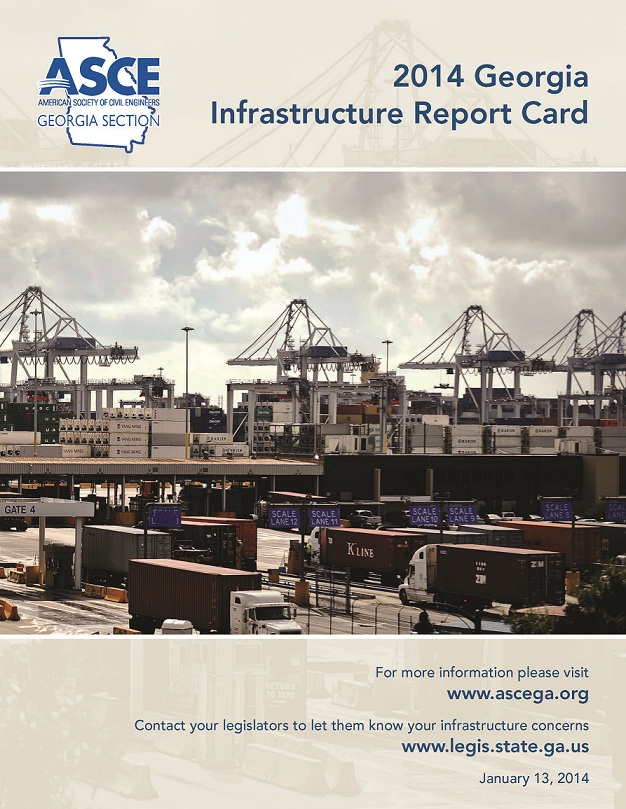 The 2014 Report Card for Georgia’s Infrastructure will be released next Monday, January 13th, in the South Wing of the State Capitol on the very first day day of Georgia’s legislative session. Highlighting the infrastructure needs across the state, the Report Card will provide a new GPA for Georgia’s infrastructure as well as new grades for specific areas — Aviation, Bridges, Dams, Drinking Water, Energy, Parks and Recreation, Ports (new), Rail (new), Roads, School Facilities, Solid Waste, Stormwater, Transit, and Wastewater.
Check back here on the 13th to find out what grades Georgia earned in the 2014 Report Card for Georgia’s Infrastructure! If you’re a supporter of Georgia’s infrastructure and in the Atlanta area, we invite you to join us for the Report Card release event:
WHAT: News conference for the release of the 2014 Report Card for Georgia’s Infrastructure
WHO: American Society of Civil Engineers, Georgia Section
Speakers: Georgia State Representative Ed Setzler
Kat Gurd, President of the Georgia Section of ASCE
Daniel Agramonte, Co-Chair of Report Card Committee
WHEN: Monday, January 13, 2014, 11:30 AM
WHERE: State Capitol South Wing
Georgia State Capitol Building
206 Washington St SW
Atlanta, Georgia 30334
WHY: Infrastructure has a direct impact on our lives every day—from the water we drink, to the schools our children attend and to the roads and rails we travel. Infrastructure is vital to our economy, security, recreation and safety. Will Georgia’s infrastructure systems make the grade?
The 2014 Report Card for Georgia’s Infrastructure will be released next Monday, January 13th, in the South Wing of the State Capitol on the very first day day of Georgia’s legislative session. Highlighting the infrastructure needs across the state, the Report Card will provide a new GPA for Georgia’s infrastructure as well as new grades for specific areas — Aviation, Bridges, Dams, Drinking Water, Energy, Parks and Recreation, Ports (new), Rail (new), Roads, School Facilities, Solid Waste, Stormwater, Transit, and Wastewater.
Check back here on the 13th to find out what grades Georgia earned in the 2014 Report Card for Georgia’s Infrastructure! If you’re a supporter of Georgia’s infrastructure and in the Atlanta area, we invite you to join us for the Report Card release event:
WHAT: News conference for the release of the 2014 Report Card for Georgia’s Infrastructure
WHO: American Society of Civil Engineers, Georgia Section
Speakers: Georgia State Representative Ed Setzler
Kat Gurd, President of the Georgia Section of ASCE
Daniel Agramonte, Co-Chair of Report Card Committee
WHEN: Monday, January 13, 2014, 11:30 AM
WHERE: State Capitol South Wing
Georgia State Capitol Building
206 Washington St SW
Atlanta, Georgia 30334
WHY: Infrastructure has a direct impact on our lives every day—from the water we drink, to the schools our children attend and to the roads and rails we travel. Infrastructure is vital to our economy, security, recreation and safety. Will Georgia’s infrastructure systems make the grade?
Tags: aviation, dams, Georgia, infrastructure, ports, roads, state, state report card, transit, water
No Comments »
Infrastructure Is the Missing Ingredient to Healthy School Lunches
December 30th, 2013 | By: Infrastructure Report Card
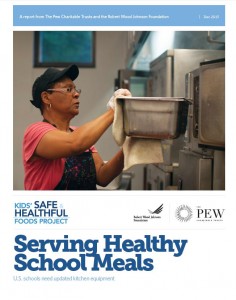 The Kids’ Safe and Healthful Foods Project lead by The Pew Charitable Trusts and the Robert Wood Johnson Foundation released a report this December titled, Serving Healthy School Meals: U.S. Schools Need Updated Kitchen Equipment. They found that 55% of school food authorities (SFAs) need kitchen infrastructure changes at one or more schools to meet new healthy lunch requirements. That’s right – the majority of America’s schools need to fix their school’s infrastructure problems in order to serve up healthy school lunches every day.
Here’s a few of their key findings:
Find out more about America’s school infrastructure needs in the Schools section of the 2013 Report Card for America’s Infrastructure.
The Kids’ Safe and Healthful Foods Project lead by The Pew Charitable Trusts and the Robert Wood Johnson Foundation released a report this December titled, Serving Healthy School Meals: U.S. Schools Need Updated Kitchen Equipment. They found that 55% of school food authorities (SFAs) need kitchen infrastructure changes at one or more schools to meet new healthy lunch requirements. That’s right – the majority of America’s schools need to fix their school’s infrastructure problems in order to serve up healthy school lunches every day.
Here’s a few of their key findings:
Find out more about America’s school infrastructure needs in the Schools section of the 2013 Report Card for America’s Infrastructure.
Tags: infrastructure, infrastructure investment, report card, schools, state
No Comments »
Celebrating Infrastructure Successes in 2013
December 27th, 2013 | By: Infrastructure Report Card
Looking back over 2013, we have many successes in making infrastructure a priority to celebrate. Here are a few that really made our year: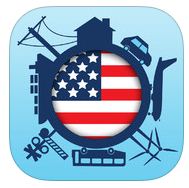 1. The 2013 Report Card for America’s Infrastructure was launched in March as a tablet and smartphone app gaining more traction with the media and decision makers than ever before and was even mentioned by President Obama during a “Rebuilding America” event at the Port of Miami.
2. Stephen Colbert showcased the uptick in America’s Report Card grades as a “Tiny Triumph” on the Colbert Report in April taking the infrastructure message to a whole new audience.
3. The Water Resources Development Act which will greatly help our ports and inland waterways deal with their pressing needs is currently in the hands of a House and Senate conference committee, and we hope to see it enacted early in 2014 (stay tuned!). It’s not too late to tell your member of Congress that this should be on Congress’ 2014 to-do list. Email them right here with a few clicks.
4. Major infrastructure funding legislative initiatives took off in several states including Maryland, Massachusetts, Pennsylvania, Virginia, Vermont, Wyoming, Texas, and Maine.
5. Several new bills were introduced that would start improving the nation’s infrastructure: The Partnership to Build America Act (H.R. 2084), which could re-shape the way infrastructure in the United States is financed; the UPDATE Act (H.R. 3636), which would increase investment in transportation infrastructure through an increase in the federal gas tax/user fee; the BRIDGE Act (S. 1716)/National Infrastructure Development Bank Act (H.R. 2553), both of which would facilitate infrastructure investment through creation of a national infrastructure bank.
1. The 2013 Report Card for America’s Infrastructure was launched in March as a tablet and smartphone app gaining more traction with the media and decision makers than ever before and was even mentioned by President Obama during a “Rebuilding America” event at the Port of Miami.
2. Stephen Colbert showcased the uptick in America’s Report Card grades as a “Tiny Triumph” on the Colbert Report in April taking the infrastructure message to a whole new audience.
3. The Water Resources Development Act which will greatly help our ports and inland waterways deal with their pressing needs is currently in the hands of a House and Senate conference committee, and we hope to see it enacted early in 2014 (stay tuned!). It’s not too late to tell your member of Congress that this should be on Congress’ 2014 to-do list. Email them right here with a few clicks.
4. Major infrastructure funding legislative initiatives took off in several states including Maryland, Massachusetts, Pennsylvania, Virginia, Vermont, Wyoming, Texas, and Maine.
5. Several new bills were introduced that would start improving the nation’s infrastructure: The Partnership to Build America Act (H.R. 2084), which could re-shape the way infrastructure in the United States is financed; the UPDATE Act (H.R. 3636), which would increase investment in transportation infrastructure through an increase in the federal gas tax/user fee; the BRIDGE Act (S. 1716)/National Infrastructure Development Bank Act (H.R. 2553), both of which would facilitate infrastructure investment through creation of a national infrastructure bank.
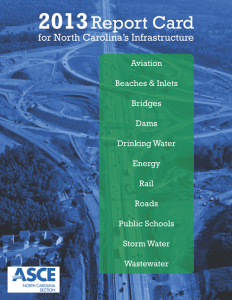 6. Five states – North Carolina, Oklahoma, Kansas, Missouri, and Washington – put out state-based Infrastructure Report Cards challenging their state’s leaders to get to work on the infrastructure issues in their area.
Thanks for your support in making these happen and we look forward to making 2014 an even bigger year for infrastructure!
6. Five states – North Carolina, Oklahoma, Kansas, Missouri, and Washington – put out state-based Infrastructure Report Cards challenging their state’s leaders to get to work on the infrastructure issues in their area.
Thanks for your support in making these happen and we look forward to making 2014 an even bigger year for infrastructure!
Tags: app, media, report card, state, state report cards, transportation, water
No Comments »
Infrastructure Investment Wins at the Ballot Box!
November 6th, 2013 | By: America's Infrastructure Report Card
Yesterday voters in Maine and Texas both affirmed ballot resolutions resulting in increased investment in their local infrastructure. In Maine voters overwhelming approved Bond Question 3, 72% in favor to 28% opposed. Bond Question 3 gives permission to the State to borrow $100 million to fund transportation projects around the state which in turn would make the State eligible for at least $154 million in matching funds. Proceeds from the sale of these bonds would be administered by the Department of Transportation and would fund at least $49 million for road projects, $27 million for bridge projects and $24 million for multi-modal projects, including facilities and equipment related to ports, harbors, marine transportation, aviation, railroads (both passenger and freight), and transit (public transportation). In Texas Proposition 6 was also approved by a large margin – 73% to 27%. Proposition 6 authorizes the transfer of $2 billion from the state’s Economic Stabilization Fund (ESF or “Rainy Day Fund”) to a State Water Implementation Fund for Texas (SWIFT). The $2 billion one-time cash infusion will be used with already authorized bonds to provide low interest loans, credit enhancement, interest deferrals, and other financial assistance to projects approved in the State Water Plan. It is expected that the SWIFT will operate as a revolving fund; with repayments funding new loans, the program should provide the financing needed to implement the projects in the 50-year State Water Plan. ASCE supported both of these initiatives through various media channels and Key Alerts to Section members in both states. In Texas, letters to the editor from ASCE members in Texas were picked up by the Houston Chronicle and Focus Daily News and KLTV in East Texas ran a video spot in which ASCE member Vik Verma, P.E., was highlighted. In Maine, two newspapers, the Morning Sentinel and the Bangor Daily News each ran supportive editorials that cited the 2012 Report Card for Maine’s Infrastructure. The voters in both of those states have shown that infrastructure investment is a priority. So should you!Tags: elections, infrastructure, state, state report card, transportation, water
No Comments »



 */ ?>
*/ ?>




